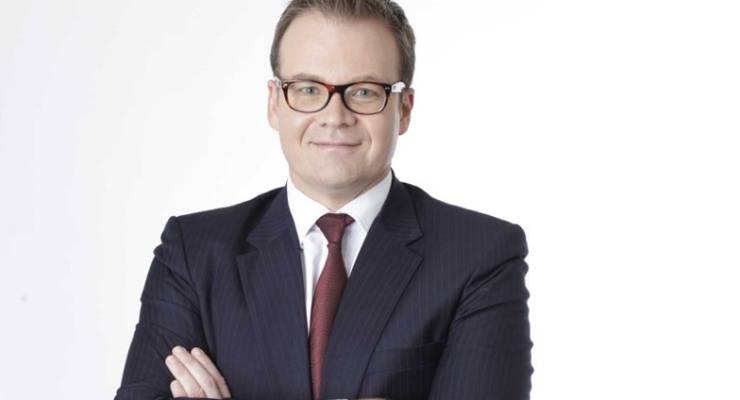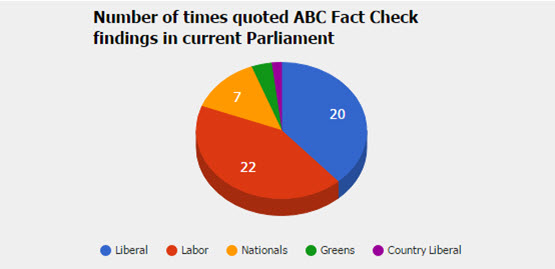
The ABC’s Fact Check unit is indeed headed for the chop, editorial managers were informed yesterday. Also being cut are several positions from the ABC’s national reporting team. All up, Crikey understands 12 news positions are being made redundant, as the ABC digests the impact of a $7 million funding reduction.
The ABC is yet to publicly confirm the cuts. But we’re told the executive producers of ABC programs were informed yesterday afternoon, several hours after Fairfax published news of Fact Check’s closure.
Fact Check’s precarious position after the budget was widely known. It was one of the initiatives funded by a $20 million-a-year, three-year grant for newsgathering operations given to the ABC in Labor’s final budget in 2013. The grant was extended in this year’s budget, but at a reduced rate.
There was a public campaign to save Fact Check, but it appears to have come to nought. Fact Check had already been cut in 2015 when its budget was halved (it launched with an initial budget of $1.5 million a year and 14 journalists) — Crikey understands the ABC decided that it would have been difficult to cut Fact Check any further without impacting on its quality.
After the election, the Fact Check brand will disappear from the ABC. The division employs six people, including the presenter of its fact checks, John Barron. Some staff might be re-absorbed back into the ABC. It’s unclear what will happen to editor Russell Skelton; The Australian has reported he will remain with the ABC. He defected from Fairfax in 2013 to head up the unit. Many of the staff in the operation are contractors.
Also funded by the $20 million-a-year newsgathering grant was the ABC’s national reporting team, which has been behind many of the ABC’s hard-hitting news investigations in recent years. Several positions are set to go from there, too.
Fact Check frequently comes up in Senate estimates, with senators keen to query how the ABC reached the verdict that it did. Because of this, Senator Nick Xenophon asked the ABC at Senate estimates three weeks ago whether anyone had ever raised Fact Check with the national broadcaster in the context of budget discussions. Corporate affairs manager Mick Millett said to his recollection that had never happened, though he took several questions on notice about the complaints about Fact Check.
In the Financial Review today, Xenophon wonders whether the division has been offered up as a “sacrificial lamb for the ABC to appease the government”.
“I’m quite outraged and I think a lot of Australians will be outraged,” he said.
While Fact Check has been the subject of controversy, it is more often quoted approvingly by politicians on both sides of the spectrum. A January 2016 analysis by Poynter found the Nationals more likely to quote ABC Fact Check than the Greens — and Labor and Liberal politicians were almost equally as likely to rely on Fact Check to ridicule their opponents for false claims.

Image: Poynter. Full spreadsheet of mentions and context (current to January 2016) is here.
ABC Fact Check was one of three fact-checking operations launched in the lead-up to the 2013 election. The highest-profile — Politifact Australia — didn’t last long, leaving the ABC’s Fact Check and The Conversation‘s FactCheck. But the ABC’s Fact Check was by far the most regular and extensive of the two — it employs three researchers who spend a week working on every verdict. Perhaps because of the time it took with its checks, it has never had to publish a correction, in more than 400 fact checks.
Yesterday, the ABC Fact Check Twitter account tweeted that its tracker of the Coalition’s 2013 election promises (19 broken, eight stalled, 21 in progress and 30 delivered) had been viewed 7 million times.








This may upset the denizens of Crikey Land of course, but until the ABC considers returning to core elements of its Charter, there won’t be too many Australian Citizens shedding tears because they already believe too much taxpayer funding is being lavished on undeserving recipients in places such as the ABC.
Why not dispose of the biased Crikey Censorship Squad and devote the savings to helping your beloved ABC?
Surely they could have waited till after the Federal Election to cut the Fact Check unit! A few weeks will make little difference financially, but they are critical ones in the political calendar.
You’ll be glad to know Fact Check is sticking around until after the election then. It ceases in the new financial year.
Whew, our politicians must be breathing a collective sigh of relief because facts frequently sully political argument.
Just what they need – a cultivated ignorance in the electorate?
This is what you get when you elect a government which hates the idea of a public broadcaster holding it to account. Hire a compliant boss, then give her the orders. Fact Check has been a very valuable and often hilarious vehicle for outing the nonsense and outright lies told by politicians. Obviously they want it gone.